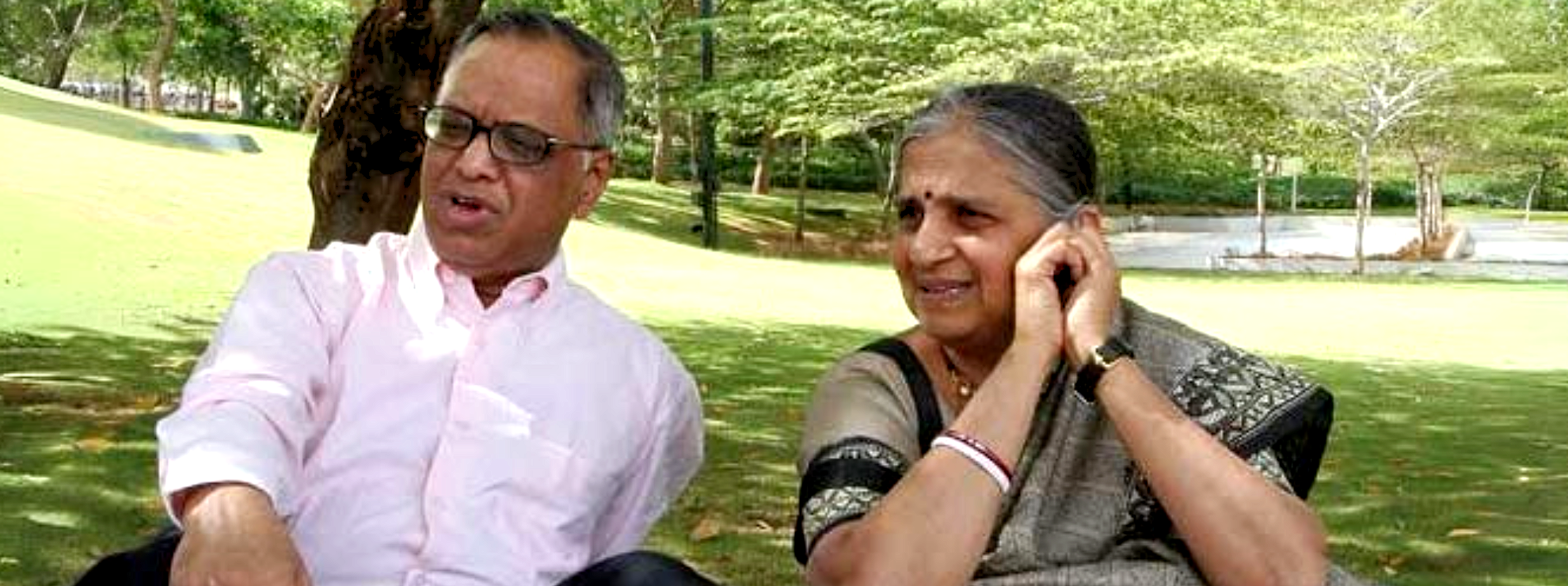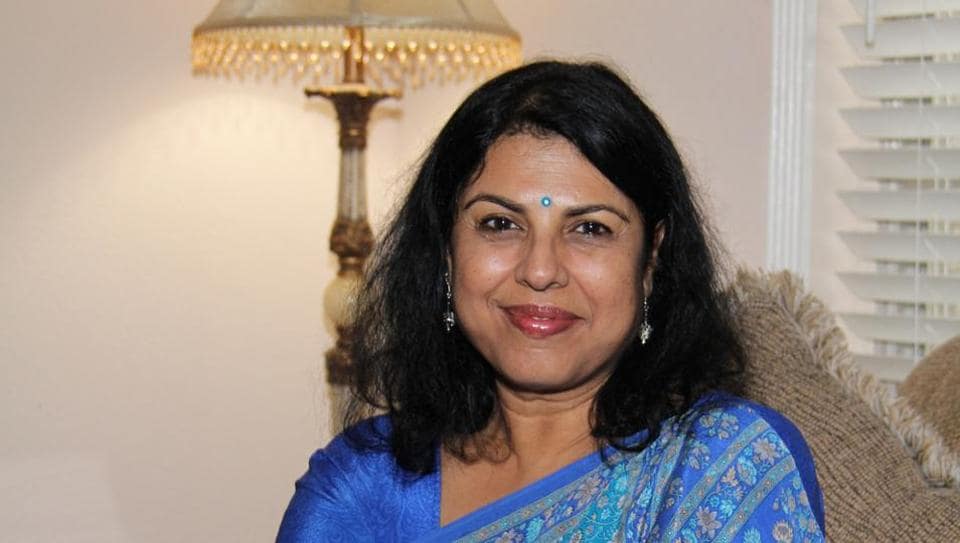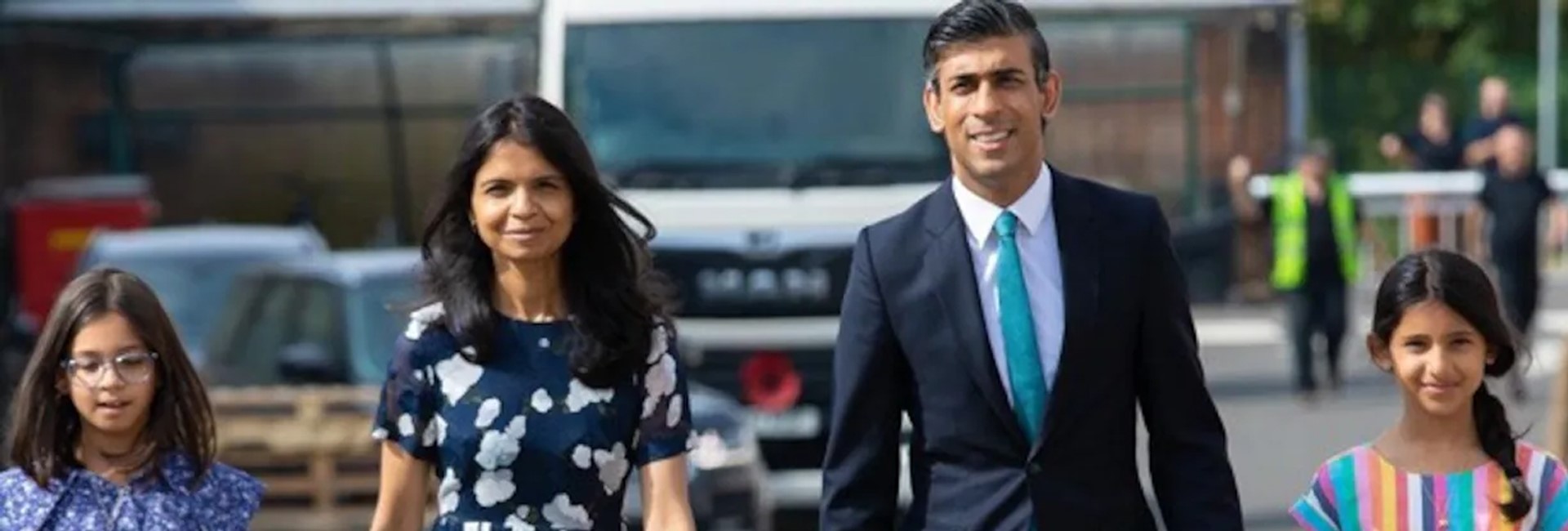(January 20, 2024) Sudha Murty and Chitra Banerjee Divakaruni first crossed paths in in the USA nearly 50 years ago. Divakaruni was a PhD scholar at the University of California, where Murty happened to be visiting her brother. “All the Indian students would come and cook in my apartment when they wanted Indian food,” Divakaruni told Vogue India. “Sudha ji‘s brother was one of them and that’s how I met her.” Decades later, life brought the two women, both powerhouses in their own right, together once more, when Divakaruni was approached Juggernaut to write the love story of Infosys co-founder Narayana Murthy and his wife, Sudha Murty. An Uncommon Love: The Early Life of Sudha and Narayana Murthy was released on January 16, and went straight to the limelight, as it takes the reader behind the scenes, into the private world of the IT tzar and his wife in a way the public has never seen before.
The book was two years in the making, with Divakaruni meeting the couple on Zoom at the start. “I was trying to show the kind of people they are, the difficulties they went through, the relationship they built, to show that these two people started off as very ordinary human beings from ordinary, middle-class backgrounds,” Divakaruni said in an interview. Just like most couples in the world, they worked at their relationship and to keep their dream alive, while raising a family. “It was an opportunity to show these people in a very different light. It was like inviting the reader into their living room,” she added. They began work through Zoom calls, after which Divakaruni and her husband spent twenty days in Bengaluru, during which time she “followed Sudhaji like a shadow,” she said, in the Vogue interview.

The early days
The story begins in 1974, when Sudha Murty, described as “a slender young woman (with) short, bobbed hair curling around her vivacious face,” first crossed paths with Narayana Murthy, thanks to a co-worker, Prasanna. Sudha, who was the first female engineer in TELCO, was living in Pune at the time. She and Prasanna became friends as they rode the same TELCO bus to and from work everyday and Prasanna was always holding a book in his hand. He was also from Karnataka and to Sudha, a connection to home. Usually, Prasanna would be reading a book Sudha had already read before, but one day, he was “engrossed in a writer she had never heard of: George Mikes.” The book had been lent to him by his friend and flatmate, who had travelled all over the world and had many adventures. He invited Sudha home to meet him.
Normally, Sudha would not have considered visiting a male friend at his flat – it was definitely a no-no in her traditional home state, Karnataka. But Pune was a progressive place, and very cosmopolitan. Besides, the idea of an entire room filled with books by foreign writers was too good to resist. Sudha was also curious about this young man. “In her mind, she imagined this intrepid world traveller to be suave and debonair, tall and broad-shouldered,” Divakaruni writes in Uncommon Love. “Maybe… because she loved Hindi movies, he would look like Rajesh Khanna, sporting sideburns and boots.”
So, meeting Narayana Murthy for the first time was a bit of a surprise – he was thin, with thick glasses, wearing a checked coat. He was very quiet, too, until they started talking about books. The two connected instantly over a shared passion for Kannada writers like Kuvempu, Shivarama Karanth and S.L. Bhyrappa. But she loved his exotic bookshelf even more and he generously offered to lend her anything she wanted, filling a shopping bag with all the books she liked. Just as she was leaving, he asked her to have dinner with him the following night. Again, it was not something Sudha would normally do, but she heard herself saying yes, adding, “But Prasanna must come with us, too. And I will pay for my dinner.”
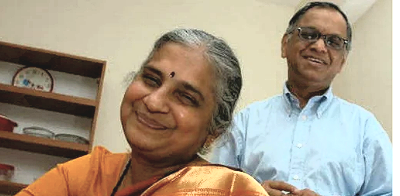
Sudha wanted to be clear that she was only meeting this young man as a friend, but sensed that he wasn’t like other men. That’s how their story begins, and it would go on to write a new chapter in the history of Bangalore city – and the country. They were soon spending most of their free time together, often at the family home of a friend, Shashi. Those were happy days, they both loved eating out, at the inexpensive cafes that students loved. They were both well read and opinionated and would often argue gently with each other.
Navigating real life
Real life often doesn’t have much in common with the first flush of romance though, and Divakaruni notes how their relationship changed, and how they weathered the ups and downs. When Murthy found himself in a low place he even tried to distance himself from Sudha, only to realise he couldn’t. That’s when he asked him to marry her. “I’m no hero – just a short man with a squint and thick eyeglasses and no job,” he told her one day, as they returned home from dinner in Pune. “You, on the other hand, are beautiful and smart. But I love you, and that gives me the courage to ask this. Will you marry me?”
In the early days, Sudha was the successful one, with the better job, one that she had struggled to get. Growing up in a traditional household in Karnataka, being educated and earning an engineering degree was a struggle – her college didn’t even have a toilet for girls. She made it through and landed a job at TELCO, only to be dismissed again for being a woman. Narayana Murthy had his own share of struggles too – his career wasn’t always going well and when he began dating Sudha, he had to prove to her family that he could take care of her. When Murthy wanted to strike out on his own, it was his wife who loaned him Rs 10,000 to start his company. He went on to forbid her from joining, which he recently accepted was a mistake, saying he was “wrongly idealistic,” believing that family shouldn’t get involved with business, even though she was more qualified than him and all the other co-founders.
Up close and personal
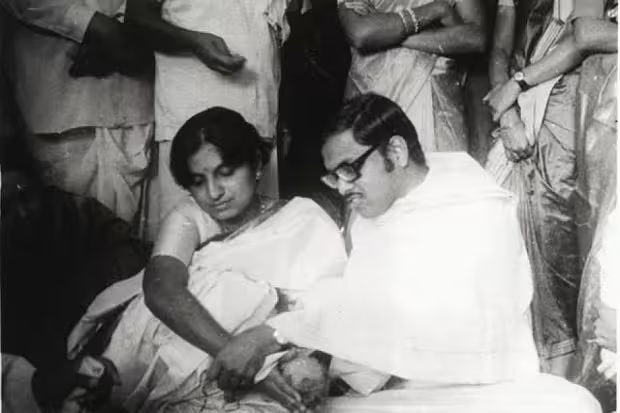
Sudha and Narayana Murthy
Their story is captivating, helped by the fact that both Sudha and Narayana Murthy are good writers. Divakaruni, of course, is one of India’s best-known writers and holds great mastery over her craft, handpicking anecdotes and instances that will keep the writer hooked from start to finish. Divakaruni describes how hitchhiking through the USSR and finding himself thrown into the jail at the railway station, converted Murthy, from a staunch socialist to ‘compassionate capitalism’. The narrative weaves through various pivotal moments in the couple’s life, starting with their unique bond formed over a love for literature. It then explores the challenges they faced, such as the awkward first encounter between Murthy and Sudha Murty’s father, their modest wedding ‘on the wrong side of the Tungabhadra river,’ costing just Rs 800, and the subsequent concerns it raised among relatives. The book also sheds light on why their honeymoon was cut short and Sudha Murty’s emotional decision against attending MIT. Further, it delves into her role in infusing optimism during hard times, her foray into writing, and managing family life with extended family support as Murthy’s professional commitments intensified.
Then again, as Sudha Murty told Vogue, things change. Murthy would take her to watch the films, which she loved, but now she goes with her friends. “Just because we’re partners doesn’t mean we can go into each other’s space,” she said. “There is no perfect person and you just have to accept a person for who they are.”
- The book is available for purchase on Amazon

